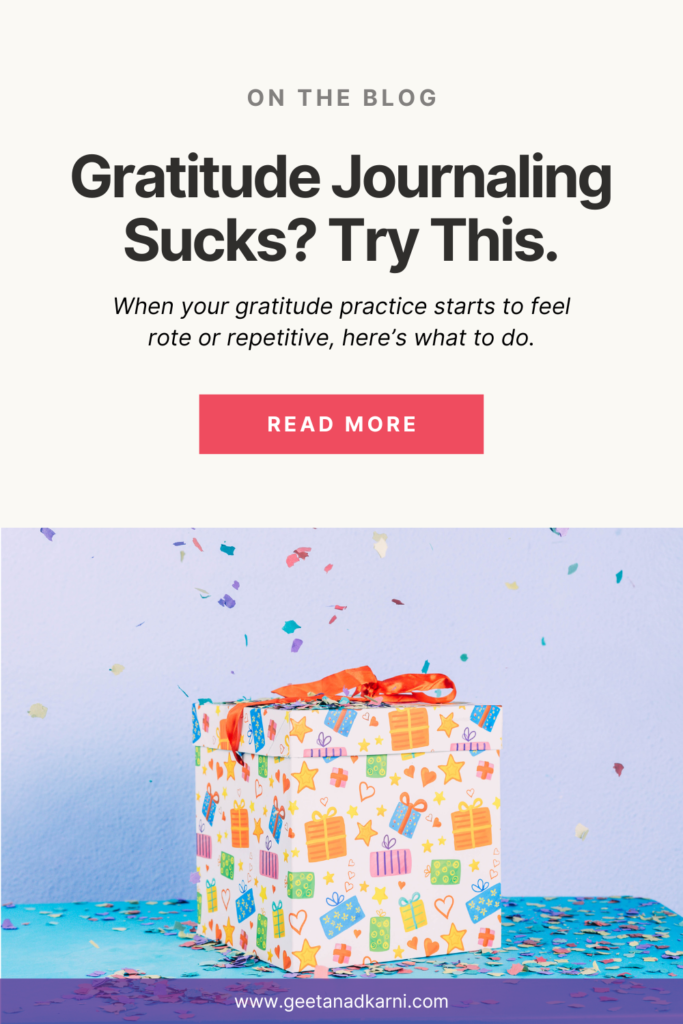One of the things I’ve always struggled with as a creative is the seeming war in my mind between novelty and consistency.
Almost anything – even the most fulfilling practice – can start to feel stale or rote when done unchanged for too long.
And gratitude journaling, unfortunately, is no exception.
If you’re new to gratitude journaling, I wrote a whole other deep dive article on the topic so it’s best to start there. But if you’re a more experienced practitioner looking for something to rejuvenate your practice, you’re in the right place.
After I wrote that other piece, I started to ask myself some uncomfortable questions about Oprah and her gratitude practice.
What changed?
Oprah’s brilliant.
She’s disciplined (as evidenced by her vast success).
She did the practice for more than 10 years and swore by it – not just as something she did privately either – she repeatedly told millions of her viewers to do it too.
And yet, despite all the incredible positive feedback that she probably got from the ritual, she… stopped.
Yeah, sure, she claims she got busy.
But as she wrote in her 2012 editorial, she was busy in 1996 too and somehow always made time for gratitude.
So why did she stop?
Did she get bored? Did the once powerful ritual feel tired, rote – a necessary evil like brushing her teeth? Did the brain’s quest for novelty win out over the consistency she’d established?
In my interviews with folks who’ve journaled a long time, I’ve noticed almost everyone has gone through phases in their lives when their established habits – even the really effective ones – seem to wobble.
The likely explanation is that the brain’s dopamine production plateaus and then actually declines as it lays down the neural track that makes the habit a habit.
Wait, what?
Yup.
By journaling daily and creating a “habit” around it, you’re risking making the process (at least somewhat) less pleasurable.
It’s the classic battle of novelty vs consistency.
Consistency helps us build great things that get better over time. It allows for compounding benefits and lowered effort and a raising of the baseline. But consistency can sometimes lead to boredom and some people are more sensitive to this than others.
Novelty, on the other hand, gives us that high we feel when we start new and exciting things. It’s what creates high motivation which can often power us through deep discomfort, inconvenience and obstacles.
Novelty wanes when enough neural pathways are created and so does our dopamine associated with that task.
This is what makes it hard to build consistency, especially when we’re one of the folks who aren’t naturally conscientious or disciplined. Yeah, that’s a thing. Peek into psychologist and healthy habit expert Michelle Segar’s “The Joy Choice” if you want to explore more on this theme.
Here are 4 science-backed strategies to keep that dopamine pumping when things start to feel meh:

- Boost novelty: Try varying the format. For example, instead of writing in your journal, send someone a postcard, public social post, Slack shout out or a text message acknowledging how grateful you are for their presence in your life. You could also try drawing instead of writing, going digital if you usually use paper (or vice versa) or simply listen to a song you love and write out the happy memories it conjures.
- Randomize: Social media companies pay experts millions of dollars to come up with ways to randomize the rewards we get when we scroll; it’s what keeps us addicted. Maybe you want to grab a fresh set of prompts to use to jazz up your routine and get fresh neurons firing.
- Reward: B J Fogg, the world’s leading researcher on habits (and the author of the excellent Tiny Habits) shares this nugget: “It isn’t repetition that creates behaviours, it’s emotion.” Do something to create a sense of joy or satisfaction when you’ve executed your journaling.
Some ideas include savoring a sip of your preferred tea or coffee, playing a current favorite song right after you finish, snuggling a pet, “temptation bundling” (which means pairing the desired activity with one you adore) by writing with a really nice pen or exciting new ink, etc.
The trick is to have the celebration or reward be immediate.
Which means waiting to accumulate 30 days of gratitudes before buying yourself that fancy pen isn’t going to cut it. Buy the pen now and then use it only when you journal, so it feels like you’re being rewarded.
- Last Time meditation: Remember that line from the Joni Mitchell hit, Big Yellow Taxi? “You don’t know what you’ve got till it’s gone.” Well, long before Mitchell had a record deal, the ancient Stoics used to do a meditation called the “last time” meditation. It’s where you imagine doing certain things for the very last time.
This doesn’t have to be morbid – though imagining how kissing a lover goodbye for the last time can make you more grateful and put any friction you have into perspective. Think about all the things you did for the last time without realizing it – had a parent carry you in their arms, rode a tricycle, grew a new tooth.
We do things for the last time every day – usually without realizing it. Paying deep attention to something as simple as washing the dishes or folding a child’s clothes can help you relish the life you have while you still have it.
At the end of the day, you want to make sure you’re harnessing the power of both novelty and consistency in your journaling practice (and other habits in your life).
Something that will really help you boost your intrinsic motivation to build a robust practice of self reflection is my 21 day journaling course. It’s designed so that even if you get busy and don’t always have the time to execute the exercises, simply reading the notes I send you will help create powerful shifts in your life.





